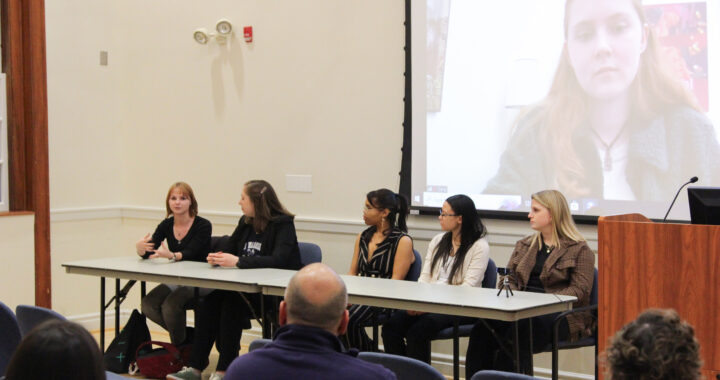Relationships, Not Money, the Key to Real Happiness
3 min readBy: CATHALIJNE ADAMS
While speaking on the statewide public radio program “With Good Reason” that aired on Richmond’s 88.9 WCVE and American University’s 88.5 on Jan. 1, University of Mary Washington psychology Professor Holly Schiffrin spoke on how to achieve happiness in times of recession.
Schiffrin urged listeners to pursue happiness by nourishing relationships instead of their bank accounts.
During the program, Schiffrin said that 50 percent of an individual’s happiness level is biologically inherited and contributes to a set-point of happiness. This set-point is the base line level of happiness the individual returns to after various moments of elation or sadness.
However, Schiffrin said that the other 50 percent of happiness may be under the control of the individual. Here, the individual is no longer simply controlled by their environment and their genetics. They are able to work to achieve greater happiness.
Schiffrin said that about 10 percent of happiness level is situational. This includes the buoyancy an individual in gets in circumstances such as earning an A on an exam or that long-sought-after promotion.
Schiffrin said, “We tend to overestimate how those circumstances will affect our lives.”
However, people may temporarily experience a heightened level of happiness upon a positive change in circumstances.
Schiffrin said, ultimately, we habituate to the changes and our happiness level returns to its biologically determined set-point once again.
In an article Schiffrin wrote for the Free Lance-Star, “If It Makes You Happy: It Can’t Cost That Much,” which also discusses happiness in times of recession, she points to a study conducted by Daniel Kahneman, a Nobel-prize-winning psychologist, that finds happiness plateaus at an income of $75,000.
In the radio interview, Schiffrin references the famous Minnesota Twin Family Study started in 1983 and directed by Dr. David Lykken.
This study sought to identify genetic and environmental influences on psychological traits like happiness. Schiffrin argues that this study fails to account for the substantial affect a person’s actions can have on their happiness. Schiffrin paraphrased the findings of Lykken’s study on happiness, “trying to be happier is futile and would be like trying to be taller because it’s so genetically determined.”
Schiffrin said that research suggests that 40 percent of happiness is impacted by intentional activity and that this portion is “the most exciting” area of research.
It is this 40 percent of happiness that is impacted by such effort on the part of the individual as cultivating relationships, volunteering or losing weight, according to Schiffrin.
Despite the number of contributors to happiness levels that people can’t control, Schiffrin said that the “probably the best predictor of happiness is good relationships. In real estate they say, it’s location, location, location. For happiness, it’s relationships, relationships, relationships.”
Thus, when it comes time for an individual to choose between working overtime at the restaurant for more pay, or rushing to a distraught friend’s house with a carton of Ben & Jerry’s, the better choice for the individual’s happiness may very well be abandoning the prospect of adding to their bank account.











